#motif index
Text
List of Deities by Classification
A0 Creator (not a god)
A100—A199. The gods in general
A101. Supreme God
A104. The Making of the Gods
A107. Gods of Darkness and Light (darkness thought of as evil and light as good).
A109.1. Triple deity
A116. Triplet gods
A111.1. Mother of the gods
A111.2. Father of the Gods
A117.5. Gods as spirits of the deified dead
A131. Gods with animal features
A132.3. Equine god / goddess
A132.5. Bear god / goddess
A132.9. Cattle god / goddess
A161.2. King of the Gods
A177.1. Gods as Dupe or Tricksters
A192. Death or departure of the gods
A193. Gods of Dying-and-rising
A200—A299. Gods of the Upper World
A210. Gods of the Sky
A220. Gods of the Sun
A240. Gods of the Moon
A250. Gods of the Stars
A260. Gods of Light
A270. Gods of the Dawn
A280. Gods of the Weather
A281. Gods of Storms
A282. Gods of the Wind
A284. Gods of Thunder
A287. Gods of Rain
A300—A399. Gods of the Underworld
A310. God of the World of the Dead
A311. Conductor of the Dead
A400—A499. Gods of the Earth (The Human Sphere)
A400. Gods of the Earth
A401. Mother Earth
A405. Gods of Nature
A410. Local Gods
A411. Gods of the Hearth and Household
A415. Gods of Clans or Nations
A420. Gods of Water
A430. Gods of Vegetation
A431. Gods of Fertility
A435. Gods of Trees and Forests
A440. Gods of Animals
A450. Gods of Trades and Professions
A451. Artisan Gods
A452. Gods of Hunting
A454. Gods of Healing
A460. Gods of Abstractions (also Z110. Abstractions personified)
A461. Gods of Wisdom
A463. Gods of Fate
A463.1. the Fates, (goddesses who preside over the fates of men)
A464. Gods of Justice
A465. Gods of the Arts
A472. Gods of Sleep
A473. Gods of Wealth
A475. Gods of Love and Lust
A484. Gods of Oaths
A485. Gods of War
A486. the Furies, (goddesses of vengeance)
A487. Gods of Death
A490. Miscellaneous Gods of the Earth
A491. God of Travellers
A493. Gods of Fire
A500—A599. Demigods and Culture Heroes
A502. Heroes or demigods as fourth race of men.
A510. Origin of the culture hero (demigod).
A515.1.1. Twin culture heroes.
A521. Culture hero as dupe or trickster.
A531. Culture hero (demigod) overcomes monsters.
7 notes
·
View notes
Text
There's this comic I LOVE called Crow Time.
The author, secondlina, often posts comics on Tumblr, but I couldn't find the specific comic I want to talk about, so here is the link:
In this comic, secondlina refers to will-o'-the-wisps as omens of death. I hadn't come across this characterization of wisps, so I did some digging, and found a couple things:
1. "Corpse-candles"
We hear the following from William Wells Newell:
"First may be mentioned the so-called " corpse-candles," supposed to precede and prognosticate a death. If luminous appearances of the sort issue from the room of a sick person, and are seen to enter the churchyard, it is taken for granted that the illness will be fatal, and that the sufferer will shortly be borne to his rest along the path followed by the apparition. The movement of the flame answers to that which may be expected from the living man; if the pace be brisk, as that of a youth skipping or running, the death of a child is indicated; if slow and even, of an elderly person. In this case the vision is, so to speak, a present reflection of the future event; inasmuch as it formerly was usual to inter by night, and in consequence torches or candles were borne by the mourners, such lamps belong to the funeral procession, which appears in an anticipatory reflex."
(Basically, that wisps appear as actual harbingers of death and light the way to the churchyard where a sick person will soon be buried after they die.)
2. Spirits of the Dead
I have found that wisps have also been called the spirits of the dead, with variations being
someone who tricked the devil and therefore could enter neither heaven nor hell when they died*
someone who moved a landmark
unbaptized infants
dishonest land surveyors
*There's a huge number of stories mentioning this phenomenon, so many that it is a folkloric motif (ATU 330).
So, the connections between wisps and death is strong enough that some people would say wisps have a stronger correlation to ghosts than to fairies. That's something I have encountered in a few of the abovementioned sources, but I feel like there's a lot more research to be done in that regard. I'm more than willing to take on that monstrous task!
#will o the wisp#ignis fatuus#jack o lantern#folklore#fairies#ghosts#magical creatures of loreve#william wells newell#katharine briggs#will smith#no not that one#the other one#irish folklore#scottish folklore#english folklore#welsh folklore#and much more#secondlina#crow time#motif index#folklore motif#spirits#corpse candles#omens of death#feu follet
0 notes
Text




in this house we love and respect all clones
#couldn't sum them up with just one gif#thompson motif index of folk literature#thompson motif index#folktale motifs#folklore memes#folklore#F. Marvels#the clone wars#sw tcw#the clones#star wars memes#waxer and boil#domino squad#echo and fives#domino twins#arc trooper fives#arc trooper echo#commander thire#also the clones calling each other brother still gets me man
73 notes
·
View notes
Text
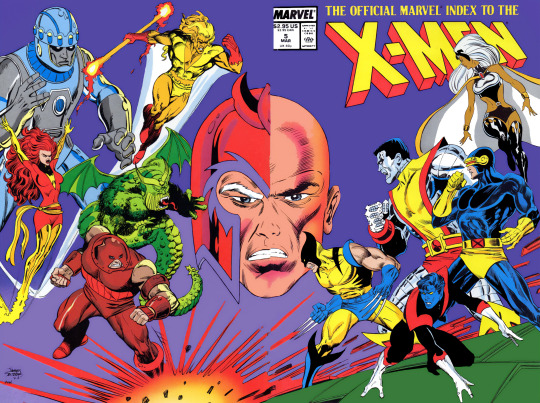
Official Marvel Index to the X-Men Vol 1 #5 / Published: March 1988 / Artist: Javier Saltares
25 notes
·
View notes
Text

5 notes
·
View notes
Text
thanks, fanfic writer brain. now i'm gonna have "i'm not exactly profiled in the stith-thompson index" stuck in my head all day
3 notes
·
View notes
Text
ngl i am holding myself back from quoting this whole chapter on the legend of jewish sorcery from jewish magic and superstition. i’m worried going through this book is going to take forever because it’s all so interesting. would also suggest people read this article--Anti-Semitic Folklore Motif Index--it’s a great primer on antisemitic tropes from the Middle Ages to present day
#the legend of jewish sorcery#jewish magic and superstition: a study in folk religion#antisemitism#antisemitic folklore motif index
8 notes
·
View notes
Text

#TIL that my roommate didn’t know that the iconic 2 hands with outstretched index fingers reaching towards each other#was not in fact an aesthetic little art motif#and was in fact Michaelangelo’s The Creation of Adam#I mean come on#slav#slav every day#voltron
12 notes
·
View notes
Text
Reading the classification list of deities on wikipedia just to feel something.
#i'm saying stuff#i love index and classification lists#this and the index of folk tale motifs are my favourites#also if you're trying to create a religious system for your fantasy sci fi story this might be a good place to start for inspiration
6 notes
·
View notes
Photo
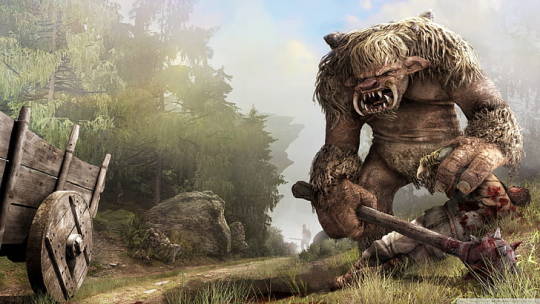
(via G. Ogres)
1 note
·
View note
Text
The Reluctant Ruler Trope: A Philosophical Inquiry into Unwanted Power, Responsibility, and the Burden of Leadership

WC: 3,489
Index
Introduction
The Reluctant Ruler in Literature and Folklore
The Existential Dilemma of Unwanted Authority
Political Implications and the Burden of Responsibility
A Special Case or a Universal Relatability?
Closing Words
Introduction
“The world is something that was put into your hands and that you must deal with - so you will. You have a rigid back and steady hands, either metaphorically or physically. Is it nature or nurture? You don't know. You are tired of being steady. You dream of feeling alive. Not that you aren’t, but, sometimes, it’s hard to remember that there is a heart between your ribs.” —“Are You A Soldier, Poet, or A King?” quiz by @atlanticsea
Does anyone here remember the “Soldier, Poet, King” quiz that went around about a year or so ago? When I initially took it, I expected “Poet;” you can imagine my surprise when the “King” result absolutely obliterated my mental health.
As I’ve found, a common theme in my writing is the Reluctant Ruler trope, where either 1) a character is thrust into the role of a savior, hero, or king/queen despite not having any wish to lead people or 2) a character assumes the role of a leader without the full understanding of the morally corrupting demands of the job.
The narrative trope of the Reluctant Ruler has long captivated the human imagination, resonating across cultures and epochs. From mythical tales of kings and queens reluctant to ascend the throne to contemporary narratives of reluctant heroes and leaders, this archetype speaks to fundamental questions about the nature of power, responsibility, and the human condition. But what makes this trope such a tragic and believable character? How do we, as an audience, end up relating to and debating the conflicts and moral dilemmas that these characters face? Today, we embark on a philosophical inquiry into the Reluctant Ruler trope, aiming to uncover its deeper meanings and implications within existential and political philosophical discourse.
The Reluctant Ruler in Literature and Folklore
The archetype of the reluctant ruler is deeply embedded in the narratives of literature and folklore, transcending cultural and historical boundaries. Across diverse traditions, tales abound of individuals thrust into positions of leadership against their will, grappling with the weight of power and the burdens of governance.
Shakespeare’s “Hamlet:” One of the most iconic depictions of the Reluctant Ruler can be found in William Shakespeare's timeless tragedy, “Hamlet.” Prince Hamlet, the melancholic protagonist, is suddenly confronted with the task of avenging his father’s murder and assuming the throne of Denmark. Despite being heir to the throne, Hamlet is plagued by doubt, indecision, and existential angst. His famous soliloquy, “To be, or not to be,” encapsulates the profound existential crisis he faces, torn between the demands of duty and the desire for personal authenticity. Hamlet’s reluctance to embrace his role as king stems not only from fear or cowardice but from a profound skepticism about the legitimacy of authority and the corrupting influence of power.
The Arthurian Legend: In the rich tapestry of Arthurian legend, the motif of the Reluctant Ruler is exemplified in the character of King Arthur himself. According to some versions of the myth, Arthur is initially unaware of his royal lineage and is raised as a commoner by Sir Ector. Upon discovering his true identity and rightful claim to the throne, Arthur reluctantly accepts the mantle of kingship, guided by the wise counsel of Merlin and the moral imperative to uphold justice and chivalry. Despite his noble intentions, Arthur grapples with the burdens of leadership, facing betrayals, challenges to his authority, and the tragic consequences of his own choices. His reluctance to embrace his destiny as king reflects the ambivalence inherent in assuming power and the moral ambiguities of governance.
The Biblical Story of Moses: In the Abrahamic traditions, the narrative of Moses provides another compelling example of the Reluctant Ruler trope. According to the Book of Exodus, Moses is initially an ordinary Israelite that ran from his station as a prince of Egypt, content to live as a shepherd in the wilderness. However, when called upon by God to lead his people out of bondage in Egypt, Moses initially resists, citing his own inadequacies and speech impediment. Despite his reluctance, Moses eventually accepts the divine mandate and becomes the revered leader of the Israelites, guiding them through the trials of the Exodus and delivering the Ten Commandments at Mount Sinai. Moses’s reluctance to assume leadership underscores the theme of human frailty and the transformative power of faith and divine providence.
The Existential Dilemma of Unwanted Authority
Despite not having instances in our lives where we are unexpectedly crowned king or being spoken to by a deity, there are still profound lessons in identity and responsibility that we can pull from these characters.
The Anguish of Freedom and Responsibility
Existentialist philosophers such as Jean-Paul Sartre asserted that “existence precedes essence,” emphasizing the radical freedom and responsibility of human beings to define their own meaning and purpose in a seemingly indifferent universe. For the Reluctant Ruler, this existential freedom becomes a source of anguish and uncertainty. Suddenly endowed with authority and influence, they are confronted with the weight of responsibility and the moral implications of their actions. The existential angst of the reluctant ruler arises from the tension between the desire for autonomy and the demands of duty, as they struggle with the paradox of being simultaneously free and bound by social expectations.
Furthermore, with freedom comes the moral imperative to act responsibly and ethically. The Reluctant Ruler, however, finds themselves burdened with the weight of moral decision-making, as they navigate complex ethical dilemmas and confront the consequences of their actions. Existentialist philosophy emphasizes the inherent responsibility of individuals to create their own moral framework and to confront the ethical implications of their choices with honesty and integrity. The anguish of responsibility lies in the tension between the desire for moral clarity and the recognition of the inherent ambiguity and uncertainty of ethical decision-making. The reluctant ruler must contemplate on the ethical complexities of their role, striving to uphold their moral principles amidst the exigencies of power and governance.
Authenticity and Self-Deception
Central to the existential dilemma of unwanted authority is the quest for authenticity (we already knew this; I wrote two posts on authenticity already that you can check out here and here)—the authentic expression of one’s true self and values in the face of external pressures and expectations. The Reluctant Ruler may experience profound existential alienation as they navigate the demands of their role, questioning whether they are living in accordance with their own genuine desires and beliefs or merely conforming to societal norms and conventions.
In fact, they may be tempted to resort to self-deception—to deceive themselves and others about the true nature of their actions or motivations. Existentialist philosophy warns against the dangers of inauthenticity and self-delusion, highlighting the existential crisis that arises from living inauthentically and betraying one’s own values. The Reluctant Ruler may succumb to the pressures of their position, rationalizing their actions or compromising their principles in order to maintain power or avoid conflict. Self-deception becomes a means of coping with the existential anguish and moral dilemmas inherent in their role, providing a false sense of security and comfort amidst the uncertainties of leadership.
Self-deception ultimately leads to existential alienation—the estrangement from one’s authentic self and the sense of disconnection from the world. The Reluctant Ruler who succumbs to self-deception finds themselves adrift in a sea of moral ambiguity and existential angst, unable to reconcile their actions with their inner convictions.
The Absurdity of Human Existence
“The Absurdity of Human Existence” is a philosophical concept rooted in existentialist thought, particularly articulated by philosophers such as Albert Camus and Jean-Paul Sartre. It posits that human life is inherently absurd, devoid of inherent meaning or purpose, and characterized by the fundamental tension between the human desire for meaning and the indifferent, chaotic nature of the universe.
In assuming positions of power unwillingly, the Reluctant Ruler confronts the absurdity of their situation, grappling with the arbitrary nature of authority and the futility of their efforts to impose order and control upon a chaotic world. The absurdity of leadership lies in the recognition of its inherent limitations and the inevitability of failure and impermanence. Despite their best intentions, the Reluctant Ruler may find themselves overwhelmed by their predicament, struggling to find meaning and significance in a world devoid of ultimate purpose.
Here is where another familiar element of existence comes into play: the illusion of control. The illusion of control is a psychological concept that refers to the tendency of individuals to overestimate their ability to influence or control events, particularly in situations characterized by uncertainty or randomness.
For the Reluctant Ruler, the illusion of control becomes apparent as they assume positions of power unwillingly and attempt to impose order and control upon a world that defies their efforts. Despite their best intentions, they soon come to realize the inherent unpredictability and uncontrollability of the events and circumstances they face. This recognition challenges their preconceived notions of authority and power, revealing the illusory nature of their perceived control.
The Reluctant Ruler may initially believe that they have the ability to shape the course of events and influence outcomes according to their will. However, as they encounter resistance, opposition, and unforeseen challenges, they begin to understand the limitations of their authority and the unpredictable nature of the world they seek to govern. This realization undermines their confidence and exposes the fragility of their sense of control.
Moreover, the illusion of control can lead the Reluctant Ruler to engage in behaviors and strategies aimed at maintaining the illusion of power, even in the face of overwhelming evidence to the contrary. They may resort to authoritarian measures, manipulation, or denial of reality in an attempt to assert their authority and preserve their sense of control. However, these efforts ultimately prove futile, further reinforcing the absurdity of their situation.
The existential implications of the illusion of control lie in its confrontation with the fundamental unpredictability and contingency of human existence. The Reluctant Ruler's quest for control becomes a Sisyphean task, as they strive to impose order upon a world characterized by chaos and uncertainty. In confronting the illusion of control, they are forced to confront the absurdity of their condition and wrestle with the inherent limitations of human agency in the face of existential uncertainty.
Political Implications and the Burden of Leadership
Naturally, we cannot talk about the complexity behind the Reluctant Ruler without diving into those whom they govern. In examining the reluctant ruler trope through the lens of political philosophy, we confront the complex interplay between governance, legitimacy, and the ethical responsibilities of leadership.
Legitimacy and Consent
The concepts of legitimacy and consent are central to theories of political authority, shaping the foundation of governance and the relationship between rulers and the ruled. In the context of the Reluctant Ruler trope, the legitimacy of political authority is called into question, as leaders may assume power unwillingly, without the explicit consent or endorsement of those they govern.
Political theorists have long debated the sources of legitimacy in governance, seeking to identify the basis upon which political authority is justified. Traditionally, legitimacy has been derived from various sources such as divine right, tradition, charisma, or popular consent. However, the assumption of power by a Reluctant Ruler complicates these traditional sources, as their authority may not be grounded in the typical mechanisms of legitimacy. Instead, the legitimacy of the reluctant ruler may be contingent upon factors such as adherence to legal norms, effectiveness in governance, or recognition by key power holders.
In democratic societies, where the principle of popular sovereignty reigns supreme, the consent of the governed is considered foundational to the legitimacy of political authority. Democratic legitimacy is typically understood to derive from the consent of the people, expressed through free and fair elections. However, the Reluctant Ruler challenges this notion, as their assumption of power may not be the result of popular choice or electoral mandate. Or, on the other hand, perhaps it was, indeed, the populace that raised them to their position while they continued to protest and fight against it. This raises questions about the compatibility of their leadership with democratic ideals and the accountability of political institutions to the will of the people.
A Special Case or Universal Relatability?
The Reluctant Ruler archetype, emblematic of individuals thrust into positions of power against their will, serves as a focal point for exploring the intricate interplay between existential realization, political pragmatism, and ethical considerations within the realm of political philosophy and ethical theory. Through the lenses of political philosophers and ethical theorists, such as Niccolò Machiavelli, Hannah Arendt, Immanuel Kant, and Aristotle, we can seek to elucidate the moral spectrum of the Reluctant Ruler, shedding light on the ethical and existential dimensions of their predicament and the broader implications for human nature and governance.
Political Philosophers:
Thinkers such as Niccolò Machiavelli and Hannah Arendt might consider the ethical and political dimensions of the Reluctant Ruler trope. They would examine questions of legitimacy, authority, and the responsibilities of leadership, shedding light on how the Reluctant Ruler’s predicament illuminates broader themes in political philosophy.
Niccolò Machiavelli
Niccolò Machiavelli, a seminal figure in political philosophy, is often associated with political realism, a perspective that emphasizes practical considerations over moral ideals in governance.
Machiavelli’s political realism emphasizes the importance of power dynamics, interests, and strategic calculations in politics. He might argue that the Reluctant Ruler cannot afford to be guided solely by moral principles or existential concerns but must instead prioritize the preservation of authority and the maintenance of order.
For him, the reluctant ruler’s primary concern should be establishing and consolidating their authority, regardless of the circumstances of their ascension to power.
He famously suggests in The Prince that rulers should be prepared to act ruthlessly when necessary, even if it means sacrificing ethical principles.
The ends justify the means in politics, and that the reluctant ruler must be willing to employ any means necessary to achieve their goals.
Ultimately, Machiavelli would likely emphasize the importance of maintaining order and stability as the primary goals of the reluctant ruler. He might argue that the ruler's legitimacy and authority depend on their ability to govern effectively and preserve the social order, even if it requires making difficult decisions or compromises.
Machiavelli might caution against allowing existential angst or moral qualms to undermine the reluctant ruler's ability to govern decisively. He would likely stress the need for pragmatism and flexibility in navigating the complexities of political life.
Hannah Arendt
Hannah Arendt was a prominent political theorist known for her contributions to the understanding of totalitarianism, the nature of power, and the concept of political action.
Arendt would delve into the existential angst experienced by the reluctant ruler, examining how their struggle with assuming power unwillingly reflects broader themes of human existence. She might explore the absurdity of the situation, where individuals find themselves thrust into positions of authority without their consent or desire.
Arendt would likely emphasize the importance of individual conscience in guiding the actions of the reluctant ruler. She might suggest that the ruler's moral integrity is central to their ability to exercise legitimate and effective leadership, even in the face of existential uncertainty.
She might also argue that political action is inherently bound up with questions of ethics and morality, and that the reluctant ruler's existential crisis serves as a catalyst for deeper reflection on the ethical dimensions of governance.
Arendt might caution against sacrificing moral integrity for the sake of pragmatic considerations, suggesting that the Ruler’s adherence to their conscience is ultimately what determines the legitimacy of their leadership.
Ethical Thinkers
Thinkers like Immanuel Kant and Aristotle would likely explore the ethical dilemmas faced by the Reluctant Ruler. They would analyze how the tension between personal ethics and pragmatic considerations shapes the Ruler’s decision-making process, offering insights into human moral psychology and the pursuit of virtuous leadership.
Immanuel Kant
Kant’s deontological ethics emphasizes the importance of moral duty and universal principles in guiding ethical behavior. He would likely analyze the Reluctant Ruler’s predicament by focusing on the categorical imperative, which states that individuals must act according to principles that can be universally applied.
Kant might argue that the Reluctant Ruler faces a moral obligation to uphold certain ethical principles, even if it conflicts with pragmatic considerations. He would emphasize the importance of acting out of a sense of duty and moral integrity, rather than being swayed by expediency or self-interest.
Aristotle
Aristotle’s virtue ethics focuses on the development of moral character and the cultivation of virtuous qualities. He would likely analyze the Reluctant Ruler’s ethical dilemmas by considering how their decisions reflect their moral virtues and character traits.
Aristotle might argue that the reluctant ruler should strive to embody virtues such as courage, wisdom, and justice in their governance. He would emphasize the importance of practical wisdom (phronesis) in navigating the complexities of political life, suggesting that the ruler should aim to achieve eudaimonia, or flourishing, through virtuous leadership.
On Our Nature
Needless to say, not only can we reflect on our own ethical “what-ifs” in parallel to the Reluctant Ruler trope; through this character study, we can unearth a multitude of political and existential debates and still never settle on a universal answer.
The perpetual debates and unanswered questions surrounding the Reluctant Ruler trope speak volumes about human nature and the complexity of individual experiences. At its core, the Reluctant Ruler archetype encapsulates the fundamental tensions between existential realization, ethical responsibility, and political pragmatism, reflecting the intricate interplay of human desires, values, and motivations.
Firstly, the inability to settle on a universal answer regarding the Reluctant Ruler trope underscores the inherent complexity and ambiguity of human existence. Human nature is characterized by its multifaceted makeup, encompassing a diverse range of perspectives, beliefs, and experiences. The reluctance of individuals to embrace leadership roles speaks to our innate desire for autonomy, authenticity, and personal fulfillment, as well as our inherent susceptibility to doubt, uncertainty, and existential angst. The analyses surrounding the Reluctant Ruler trope reflect the diversity of human experiences and the myriad ways in which individuals examine with questions of identity, purpose, and morality.
Moreover, the fact that many individuals can relate to the Reluctant Ruler trope on a personal level speaks to the universality of human struggles and aspirations. Whether it be the fear of assuming responsibility, the desire for authenticity and self-expression, or the ethical dilemmas inherent in leadership, the themes embodied by the Reluctant Ruler resonate with people from all walks of life.
However, the Reluctant Ruler trope also serves as a mirror through which we can reflect on our own ethical convictions, political beliefs, and existential uncertainties. By examining the complexities of this archetype, we are compelled to confront our own values, biases, and assumptions, and to consider how they shape our perceptions of leadership, responsibility, and human nature. The inability to settle on a universal answer regarding the Reluctant Ruler trope challenges us to confront the inherent ambiguity and uncertainty of human existence, prompting us to engage with questions of identity, meaning, and morality in our own lives.
Closing Words
What initially appears as a narrative device in storytelling reveals itself as a mirror reflecting the intricacies of our own ethical frameworks, existential dilemmas, and political realities.
At its essence, the Reluctant Ruler archetype embodies the universal struggle between autonomy and responsibility, authenticity and conformity, freedom and obligation. Yet, beyond the realm of fiction, it prompts us to reflect on our own ethical convictions and existential uncertainties. Are we, too, begrudging in our own lives, navigating the delicate balance between personal desires and societal expectations? Do we confront the existential angst of freedom and responsibility, or do we succumb to the illusion of control and self-deception?
Moreover, the Reluctant Ruler challenges us to examine the legitimacy of political authority and the ethical responsibilities of leadership. In a world where governance is often characterized by power struggles and moral ambiguities, how do we reconcile the demands of pragmatism with the imperatives of justice and integrity? How do we ensure that those in positions of power govern with wisdom, virtue, and compassion?
Ultimately, the Reluctant Ruler trope serves as a catalyst for introspection and dialogue, inviting us to confront the complexity of human nature and the ethical dimensions of governance. As we scrutinize the unresolved questions and perpetual debates surrounding this archetype, we are reminded of the enduring relevance of philosophy in our quest for understanding, meaning, and ethical clarity.
In the end, the Reluctant Ruler challenges us not only to ponder the existential dilemmas of fictional characters but also to confront the ethical complexities of our own lives and societies. It is through this introspective journey that we may gain deeper insights into the nature of leadership, autonomy, and the human condition, and perhaps, find a path towards a more just, compassionate, and authentic world.
#writers on tumblr#writeblr#writers#on writing#creative writing#writer#writing#writers and poets#writerscommunity#novel writing#writing life#writing community#writing inspiration#writing tips#writer stuff#writers of tumblr#writer community#writer problems#writer things#writer on tumblr#writing trope#tropes#character tropes#trope talk#trope analysis#trope prompts#tropes i love#characterization#writing tropes
133 notes
·
View notes
Note
Hi! I really want to read the vulgate cycle but I have a hard time staying focused when reading it. Are there any sections of the vulgate that are not as important to the understanding or able to skip? Thank you so much for making all these stories accessible and thanks for your reply :))
Hello my friend! This is a great question and one I get a lot. The Vulgate Cycle is long and daunting, but I can help you navigate it!
Firstly, here is the full Vulgate Cycle PDF collection for everyone to read. Secondly, I'll summarize what you can do, and elaborate below a cut.
TL;DR
If reading a PDF, use CTRL+F to find your favorite character's name/stories.
If reading a physical copy, utilize the index (located at the very end of the Post Vulgate) to find them.
Discover chapters of interest from the summary page (also located at the very end of the Post Vulgate).
Skip The History of the Holy Grail and begin with The Story of Merlin or Lancelot I.
Now, let's break down the ways you can navigate the Vulgate Cycle step by step.
CTRL+F
This option will certainly be less effective if your favorite character is a prominent one such as Lancelot or Gawain as they appear a million times. However, if you want to learn more about someone else, say, the Lady of the Lake, you can search her up and find every instance of her appearance. Like so.
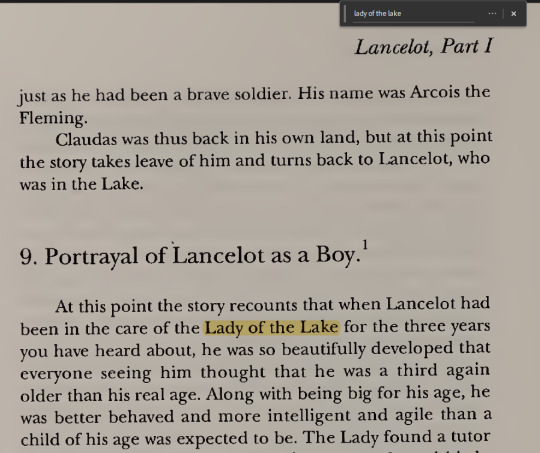
Index
In the very back of the final book of the Post Vulgate, there's an Index listing every named character [Ex: Gawain], location [Ex: Orkney Isles], entity [Ex: Holy Spirit], animal [Ex: Gringalet the horse], and language [Ex: Hebrew] mentioned in the entirety of the Vulgate Cycle. There you'll find a list of which book/chapter/page they appear in. Here are all the mentions of Gawain's horse in The Book of Merlin.

Chapter Summaries
Each book of the Vulgate Cycle has a Table of Contents with the chapter numbers and long, descriptive titles. That alone may give you an indication of what you want to read. However, at the back of the Post Vulgate, right before the Index, there's a list of every chapter in the Vulgate Cycle with a summary of events. That will give you more detail and may help you decide if you want to read in full.
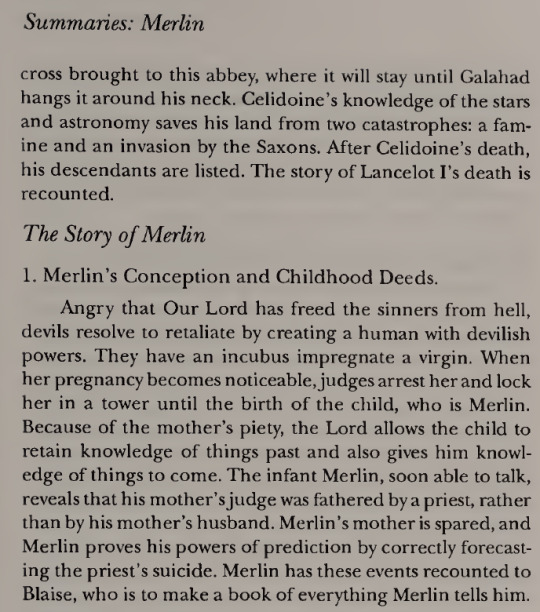
Skip
If it sucks, hit da bricks. The beauty of the Vulgate Cycle is that you don't need The History of the Grail or The Book of Merlin to understand what comes later. I enjoy them because History gives a ton of background to the religious themes the Grail Quest will eventually explore and sets up all the motifs way in advance and Merlin has the Orkney Bros as well as Yvain and Sagramore as kids which is fun. But the fact is you can begin with Lancelot I and you won't be lost. Lancelot I was written first, Merlin is a prequel, so it's optional, and the motifs of the Grail Quest are going to be heavy handed when you get there anyway without the added stuff from History. That's hundreds of pages you can skip if you want to! Norris J. Lacy, the head editor, and his translation team did a phenomenal job with footnotes throughout, so if a character off-handedly refers back to something, you can rely on them to leave a little note at the bottom for you to refresh your memory with. It'll even give you a chapter/page number if you want to refer back yourself. Here's a footnote referring to Agravaine's unnamed amie [his ladylove] who helped wing woman her sister to romance Gawain. That was 4 chapters prior to this moment.
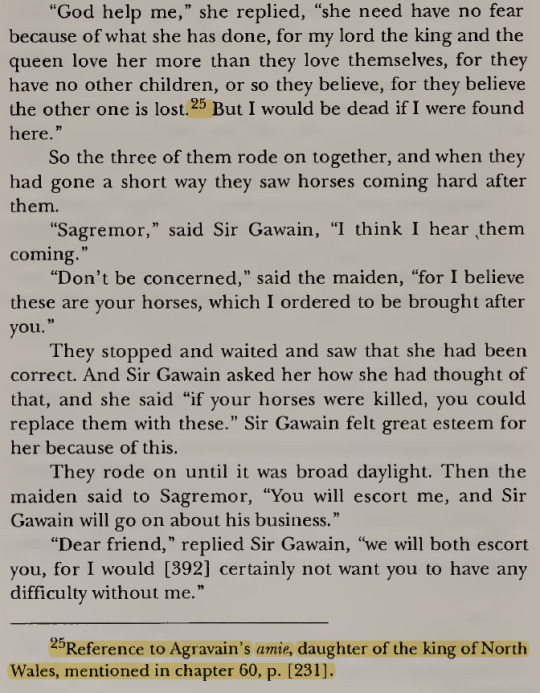
So there are plenty of ways to navigate the Vulgate Cycle and make it more digestible. That being said, it's translated so beautifully by Lacy and his team, that it reads like a modern novel. I have no doubt that once you get started, you'll become invested, and find it much easier to work through than you first thought. It's long-winded and character dense but it's fun. I do hope you're able to read it and understand why I love it so much! Thanks for this ask and I hope this helps. Have a great day!
#arthurian legend#arthurian legends#arthuriana#arthurian mythology#arthurian literature#the vulgate cycle#the vulgate#vulgate#post vulgate#quotes#resource#reading recommendations#my post#ask
73 notes
·
View notes
Text
‘The uncanny’ is first and foremost a sort of theme-index: an obsessional inventory of eerie fantasies, motifs, and effects, an itemized tropology of the weird. Doubles, dancing dolls and automata, waxwork figures, alter egos and 'mirror’ selves, spectral emanations, detached body parts ('a severed head, a hand cut off at the wrist, feet that dance by themselves’), the ghastly fantasy of being buried alive, omens, precognition, déjà vu...What makes them uncanny is precisely the way they subvert the distinction between the real and the phantasmic.
Terry Castle, The Female Thermometer
277 notes
·
View notes
Text

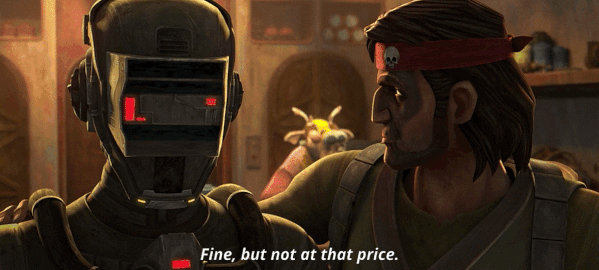


Poor Echo, honestly
#confederate in this case means accomplice not like a confederate soldier or anything#just to clarify lol#thompson motif index#folklore memes#folktale motifs#thompson motif index of folk literature#k. deceptions#folklore#star wars memes#the clone wars#tbb#the bad batch#tbb echo#arc trooper echo
31 notes
·
View notes
Text

Marvel Comics Index Vol 1 9A / Published: April 1982 / Artist: Brent Anderson
#brent anderson#marvel comics index#1980s xmen#gatefold#non comic cover#original xmen#team pictures motif
28 notes
·
View notes
Text
˚₊· ͟͟͞͞➳❥ CONTENT WARNINGS: 18+!!! fem!reader. references to breasts/pussy. you send nudes to reigen and reigen leaves you a nice lil voicemail.



despite all your urging, reigen just will not upgrade from that flip phone of his so you have to resort to the only alternative you have: email. because you are not about to send a top-tier nude only for it to get compressed to hell and back by the archaic technology's pixel limitations.
( 📨 YOU'VE GOT MAIL! )
you're a fiend when it comes to teasing reigen; you don't just stop at one nude. no, no- that's no fun. the first of many in the email thread starts tame enough but it's still wickedly enticing: a mirror selfie, showing you with the same tussled hair you woke up with and dressed in nothing but one of reigen's sleep shirts. the bottom hem is riding up just enough to give him an appetizing view of your thighs but just you in his shirt is enough to drive him wild. he's in front of a client when he gets the email notification and he knows your scheme but he can never resist opening any message from you up as soon as he receives it. it's fine, he can recover.
the second image is another mirror selfie, the motif for the day it seems. only now the shirt is raised, your panties on full display. he has to minimize the window fast, lest he incur further damage than the twitch in his pants.
the third is the first with a caption: "miss you arataka" the shirt's long been tossed aside, but instead of seeing the matching bra to your underwear, he's given an eye full of your bare breasts. your free hand has one of your tits squeezed, the expression on your face impish because you know reigen is going to go so red, so hot that steam will practically be shooting from his ears. you're right, but now reigen has to relieve himself in the bathroom because if he doesn't, he'll still be hard by the time his next appointment comes in.
the last is the piece de resistance: a video. like all the others, you're still in front of the mirror and perched at the end your bed. you have your legs spread, giving the camera (and reigen) a perfect view of your dewy pussy, your clit puffy as you roll circles around the hood with your index finger. the phone captures your breathy moans perfectly, picking up on every incantation of arataka and every rolling groan. you grind your hips against your own hand, lightly so as not to lose your balance but the friction is enough for you to bite your lip. the video abruptly ends, much to reigen's behest.
and he's sure to let you know his dismay.
because reigen doesn't prefer to send nudes. no, his form of phone sex is voicemails.
"oi- what's going on today?" you can hear the cling of his belt buckle in the background. "you know i'd go home to you but every client's confirmed today... this'll have to do." the last sentence is more for him than you. you hear the rustling of his slacks, the relief in his groan when he finally frees his aching cock. reigen spits into his hand p-tuhh! and then you hear the squelch of his strokes, the sound getting louder and faster by the second. "hhhnn-- haah-- haah," now his noises are getting you going. "you look so good. hngh, need to fill you up. you better be ready for me when i get home." he grunts and you hear a thump! as his back falls to the wall, reigen's pants a continued soundtrack as he masturbates to the pictures and videos you spoiled him with throughout the day. this doesn't go on for long, it's hard for reigen to contain himself when it comes to you. and so, the finale to his voicemail is the delicious sound of him cumming, no doubt into his own hand, all the while he croons your name. "see you in a bit." he rasps into the phone's microphone before you hear a click.

*₊˚💬୧ hehehe last piece for the year! thank you to everyone for all your encouragement, laughs, and love. it means the world to me and i hope we get to bond more over stupid sexy animemen in 2023. also not sober atm so THIS IS NOT PROOF READ AIGHT!!!
#reigen#reigen arataka#mp reigen#reigen arataka x reader#reigen x reader#reigen x you#reigen arataka x you#reigen arataka smut#mp100 imagines#mob psycho x reader#mob psycho 100 x reader#.˚₊ ੈ ʚ 🍰 ɞ ₊˚. ꒰ a little treat for reigen. ꒱
455 notes
·
View notes